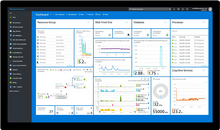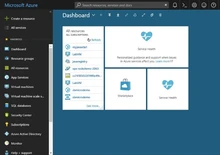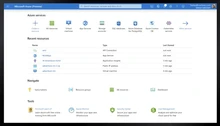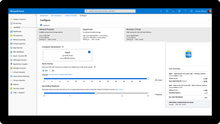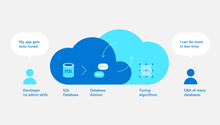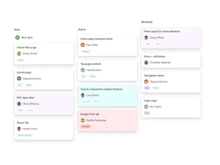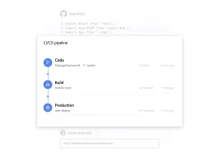Overview of Microsoft Azure and Azure DevOps
Microsoft Azure and Azure DevOps are both popular services from Microsoft, but they serve different purposes and cater to different aspects of software development, deployment, and infrastructure management. However, Microsoft Azure is a cloud computing platform, but DevOps is part of the 200+ products that Azure offers.
What is Microsoft Azure?
Microsoft Azure, also known as Azure, is a full-featured cloud computing platform and infrastructure service provider. Through Microsoft-managed data centres, it provides a broad range of services and tools. This platform lets developers and organisations create, deploy, and manage applications and services.
What is Azure DevOps?
Microsoft offers software development teams a suite of development tools and services called Azure DevOps. Its main goal is to facilitate project management, version control, continuous integration, and continuous delivery (CI/CD) in a collaborative environment. The full DevOps lifecycle, from planning and coding to testing and release, is covered by DevOps.
Microsoft Azure vs Azure DevOps: Key Differences
| Comparison: Microsoft Azure vs Azure DevOps |
| Aspect |
Microsoft Azure |
Azure DevOps |
| Primary Focus |
Cloud computing services for building and hosting applications, databases, and workloads. |
DevOps lifecycle management, including CI/CD, version control, project management, and collaboration. |
| Target Audience |
IT professionals, cloud architects, and system administrators. |
Software development teams, DevOps engineers, and project managers. |
| Core Offering |
Cloud infrastructure and services like VMs, storage, networking, AI, etc. |
Development tools like version control, CI/CD pipelines, agile project management, and testing tools. |
| Use Case |
Infrastructure-as-a-Service (IaaS), Platform-as-a-Service (PaaS), and Software-as-a-Service (SaaS) solutions. |
Automating software delivery processes, managing code, and collaborating on development projects. |
| Deployment Focus |
Hosting and running applications in the cloud. |
Automating the delivery, testing, and release of software. |
| Tools |
Azure Compute, Azure Storage, Azure Networking, etc. |
Azure Boards, Azure Repos, Azure Pipelines, Azure Test Plans, Azure Artifacts. |
| Integration |
Works with multiple third-party tools and platforms for cloud services. |
Integrates well with Azure Cloud and other Microsoft products but also supports open-source and third-party tools. |
| Example |
Hosting a website or web application, scaling infrastructure. |
Managing a software development lifecycle (SDCL) from planning to release. |
| Pricing |
Price on Request |
Price on Request |
| Reviews |
Microsoft Azure Reviews |
Azure DevOps Reviews |
Detailed Comparison of Microsoft Azure and Azure DevOps
In this detailed comparison, we will explore their core features, differences, and use cases, and help you understand when to use each one.
-
Microsoft Azure vs Azure DevOps: Scope
While both MS Azure and Azure DevOps are integral to modern development practices, they cater to different needs. Azure is ideal for companies looking to leverage cloud infrastructure and services to build, host, and scale applications and data workloads.
In contrast, DevOps is a suite of tools focused on software development teams. It offers capabilities that support the continuous delivery pipeline, version control, and project management. Azure DevOps server helps in managing the product lifecycle and servicing.
-
Azure vs Azure DevOps: Target Audience
The target audience for Microsoft Azure is primarily developers, IT professionals, and system administrators. Businesses of all sizes that want to leverage cloud computing services for their applications and infrastructure also choose Azure. While Azure DevOps specifically targets software development teams, DevOps engineers, project managers, and anyone involved in the SDLC.
-
Azure and Azure DevOps: Core Components
Microsoft Azure provides computing services such as virtual machines (VMs), container services/Azure Kubernetes Service (AKS), and serverless computing (Azure Functions) to run apps and workloads. This scalable platform offers secure cloud storage solutions, including Blob Storage, Azure SQL Database, and Azure Files.
Virtual Networks, Load Balancers, VPN Gateways, and CDN are part of Azure’s robust networking capabilities. Along with these features, AI, ML, DevOps and GitHub Actions are other major components of Azure. In contrast to Azure, DevOps provides fewer tools such as Azure Boards, Azure Repos, Azure Pipelines, Azure Test Plans, and Azure Artifacts.
-
Microsoft Azure vs Azure DevOps: Use Cases
Azure is used for providing cloud infrastructure, disaster recovery, machine learning and AI. Azure helps in hosting VMs and apps, analysing large datasets, and implementing backup and recovery solutions for business continuity.
Whereas DevOps helps to automate the build, test, and deployment processes to ensure consistency. This product manages code repositories and branches and tracks work items, user stories, and tasks using boards and backlogs.
-
MS Azure vs Azure DevOps: Pricing
Microsoft Azure pricing plans and Azure DevOps services pricing plans differ according to the products and tools chosen in the plans. Each product and tool has different pricing, starting from $2 per GB (first 2GB free) for DevOps Services and $29 per month for Azure.
Azure’s Developer plan costs $29 per month, the Standard plan costs $100 per month, the Professional Direct costs $1000 per month, and the Basic plan is free of cost. Whereas in DevOps, the Azure Artifacts costs $2 per GB, the Basic plan costs $6 per user per month, the Azure Pipelines costs $15 per job and the Azure Pipelines costs $40 per job.
When to Use Microsoft Azure or Azure DevOps?
Using MS Azure:
- If you need a cloud platform for hosting, managing, and scaling your applications or infrastructure.
- If you require cloud storage, databases, or networking for your applications.
- If you're planning to take advantage of artificial intelligence, machine learning, or big data capabilities.
- If you need a global infrastructure for deploying and hosting your applications, with high availability and disaster recovery capabilities.
- If you're running enterprise workloads, databases, or websites, and need security, compliance, and scalability.
Using Azure DevOps:
- If you are working with software development teams and need to manage the software development lifecycle.
- If you want to implement continuous integration and continuous delivery (CI/CD) for your application.
- If you need to manage source control, track work items, and manage development pipelines.
- If you want to enable collaboration and improve productivity among your developers, testers, and project managers.
- If you're using Agile methodologies and need tools like backlogs, sprints, and Kanban boards.
Conclusion
MS Azure and Azure DevOps both provide a way to develop and manage applications in the cloud. However, the main difference between Azure DevOps and Microsoft Azure is the former is a subset of latter. Azure is a platform for IT professionals and system administrators to manage cloud resources whereas DevOps is used to streamline the software development process.
It offers features like code management, CI/CD pipelines, and collaboration tools. Essentially, the teams looking to manage SDCL can source control, build automation, test, and deploy with DevOps. In many cases, the two can be used in tandem: developers can build and host their applications on Microsoft Azure while managing the development lifecycle with Azure DevOps.


 1 Ratings & 1 Reviews
1 Ratings & 1 Reviews


